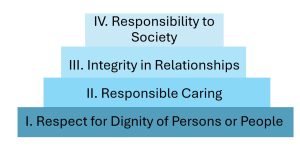- No Harm: The most direct ethical concern of the scientist is to prevent harm to the research participants.
- Informed Consent: Researchers must obtain informed consent, which explains as much as possible about the true nature of the study, particularly everything that might be expected to influence willingness to participate. Participants can withdraw their consent to participate at any point.
Infants and young children cannot verbally indicate their willingness to participate, much less understand the balance of potential risks and benefits. As such, researchers are oftentimes required to obtain written informed consent from the parent or legal guardian of the child participant. Further, this adult is almost always present as the study is conducted. Children are not asked to indicate whether they would like to be involved in a study until they are approximately seven years old. Because infants and young children also cannot easily indicate if they would like to discontinue their participation in a study, researchers must be sensitive to changes in the state of the participant, such as determining whether a child is too tired or upset to continue, as well as to what the parent desires. In some cases, parents might want to discontinue their involvement in the research. As in adult studies, researchers must always strive to protect the rights and well- being of the minor participants and their parents when conducting developmental research.
- Confidentiality: Researchers must also protect the privacy of the research participants’ responses by not using names or other information that could identify the participants.
- Deception: Deception occurs whenever research participants are not completely and fully informed about the nature of the research project before participating in it. Deception may occur when the researcher tells the participants that a study is about one thing when in fact it is about something else, or when participants are not told about the hypothesis.
- Debriefing: At the end of a study debriefing, which is a procedure designed to fully explain the purposes and procedures of the research and remove any harmful aftereffects of participation, must occur.


